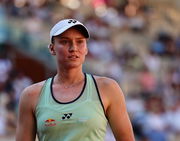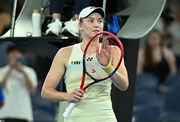
Imago
October 27, 2025, Paris, France, France: Alex MICHELSEN of United States during the first day of the Rolex Paris Masters 1000 tennis tournament at La Defense Arena on October 27, 2025 in Nanterre near Paris, France. Paris France – ZUMAm308 20251027_zsp_m308_054 Copyright: xMatthieuxMirvillex

Imago
October 27, 2025, Paris, France, France: Alex MICHELSEN of United States during the first day of the Rolex Paris Masters 1000 tennis tournament at La Defense Arena on October 27, 2025 in Nanterre near Paris, France. Paris France – ZUMAm308 20251027_zsp_m308_054 Copyright: xMatthieuxMirvillex
It was the 27th of October in Paris, a crisp night at the Accor Arena, where the ATP Rolex Paris Masters was in full swing. In the first round of the men’s singles, all eyes were on 19-year-old American Alex Michelsen. Ranked around the world No. 35, he came in as the favorite against Belgium’s world No. 41, Zizou Bergs. Most thought Michelsen would take charge. Rather, the night happened in a manner that few could have expected.
Watch What’s Trending Now!
Bergs came out on top, winning the opening set 6-3. In response, Michelsen fought hard in the second set, sweeping through 6-2 with his trademark clean, self-assured hitting. A change started to be noticed by the audience. Nevertheless, the last set changed the tide again. Bergs came early and claimed victory 6-2, taking advantage of the growing frustration of Michelsen. Having had difficulty with rhythm all season, the Belgian scored one of the more unlikely victories in the tournament and will advance to the next round, where he will face Jannik Sinner. Then came the moment that had everyone talking.
As soon as the final point ended, Bergs broke into a playful moonwalk near the baseline, drawing cheers and laughter from the Paris crowd. It was a brief, lighthearted celebration… an expression of joy that contrasted sharply with what followed across the net. On the other side, Michelsen, consumed by frustration, walked forward and smashed his racket three times. Two young players, two very different emotions. Still, they met at the net for a sportsmanlike handshake.
ADVERTISEMENT
For Michelsen, it wasn’t the first time emotions had gotten the better of him. Back in August 2024, during the Winston-Salem Open final, he’d hit a ball into the stands in anger after a poor shot. A spectator was struck, and while Michelsen avoided default, the moment drew criticism. He apologized publicly and admitted he needed to handle frustration better.
View this post on Instagram
Then, just a few months later, at the Next Gen ATP Finals in December 2024, another tough moment came. Michelsen was serving for the third set at 3-2, 40-30, one point away from sealing it, when he had an easy volley to finish the game. But nerves crept in. He hesitated and sent the ball out. The miss cost him the set and, eventually, the match.
ADVERTISEMENT
Afterward, he admitted, “It was a tough moment. I’m probably going to see that a million times when I open Instagram. I thought he wasn’t going to get it back, and then I didn’t want to reach over the net and smash it, so I went to drop it but I was a little tight when I saw it come back over and I just missed it.” That honesty showed the other side of a player still growing under the spotlight. Michelsen’s game is powerful, and his potential is real, but these flashes of frustration have become part of his story.
ADVERTISEMENT
When stats fail to predict the storm in the Paris Masters
Interestingly, the stats before the Paris match showed how close this duel might be. Bergs had been winning 47% of his points on second serve this season, Michelsen 48% nearly identical. On return, Bergs had taken 25% of opponents’ first-serve points, Michelsen the same. Even their second-serve return rates were separated by just a single percentage point (46% vs 47%). When it came to saving break points, Bergs had managed 58% this season, Michelsen 57%. Both showed strong composure under pressure, but Bergs had the edge when the big points arrived.
The surface stats were also interesting: Berg’s best record had been on grass (64% win rate), while Michelsen had thrived on indoor hard courts (70% win rate). In theory, Michelsen should have benefited from the circumstances in Paris. Sport, however, rarely remains on paper. Michelsen had lost to Francisco Cerundolo 6-3, 6-1 in just over an hour at the Erste Bank Open in Vienna just a week prior. Bergs had also been having trouble, losing to Raphael Collignon in Brussels. Both had something to prove when they arrived in Paris. By the end of the evening, however, Bergs was the one who maintained his composure when it counted.
Top Stories
How Much Did Aryna Sabalenka’s Australian Open Jewelry Cost? Designer and Materials Explained

Is Elena Rybakina Dating? All You Need To Know About WTA Star’s Boyfriend

Who Are Elena Rybakina’s Parents & Siblings? Everything to Know About WTA Star’s Family

What Is Elena Rybakina’s Ethnicity, Religion, and Nationality? Exploring Her Family Roots and Background

What Is Elena Rybakina’s Net Worth in 2026? Career Earnings, Endorsement Deals and More

These are the games that mold a career for a young player who is still learning how to handle pressure. It’s likely that Michelsen will move on, get back together, and return stronger. However, for the time being, Paris will be remembered for that one passionate racket swing that encapsulated what it’s like to lose when you were expecting to win, rather than for his forehand or serve.
ADVERTISEMENT
ADVERTISEMENT
ADVERTISEMENT
ADVERTISEMENT
